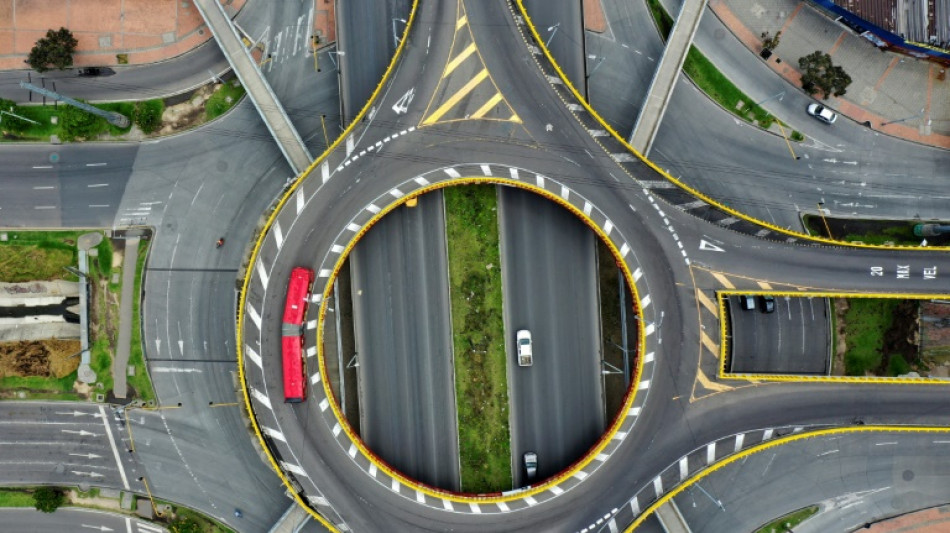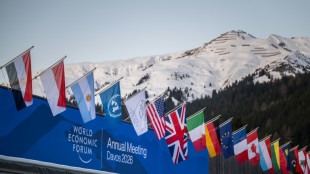
-
 EU leaders take stage in Davos as Trump rocks global order
EU leaders take stage in Davos as Trump rocks global order
-
Blast at Chinese restaurant in Kabul kills 7

-
 Warner hits 'Sinners' and 'One Battle' tipped for Oscar nominations
Warner hits 'Sinners' and 'One Battle' tipped for Oscar nominations
-
Colombian paramilitary-turned-peace-envoy sentenced over atrocities

-
 Gilgeous-Alexander leads Thunder in rout of Cavaliers
Gilgeous-Alexander leads Thunder in rout of Cavaliers
-
Seahawks blow as Charbonnet ruled out for rest of season

-
 Kostoulas stunner rescues Brighton draw after penalty row
Kostoulas stunner rescues Brighton draw after penalty row
-
Man Utd greats tell Martinez to 'grow up' as feud rumbles on

-
 LeBron James' All-Star streak over as starters named
LeBron James' All-Star streak over as starters named
-
Allies tepid on Trump 'peace board' with $1bn permanent member fee

-
 Ninth policeman dies in Guatemala gang riots, attacks
Ninth policeman dies in Guatemala gang riots, attacks
-
Man City's Foden to play through pain of broken hand

-
 Milan Fashion Week showcases precision in uncertain times
Milan Fashion Week showcases precision in uncertain times
-
Public media in Europe under unprecedented strain

-
 Africa Cup of Nations refereeing gets a red card
Africa Cup of Nations refereeing gets a red card
-
Tributes pour in after death of Italian designer Valentino

-
 Bills fire coach McDermott after playoff exit: team
Bills fire coach McDermott after playoff exit: team
-
Chile wildfires rage for third day, entire towns wiped out

-
 Valentino, Italy's fashion king who pursued beauty at every turn, dies at 93
Valentino, Italy's fashion king who pursued beauty at every turn, dies at 93
-
France PM to force budget into law, concedes 'partial failure'

-
 Allies tepid on Trump 'peace board' with $1bln permanent member fee
Allies tepid on Trump 'peace board' with $1bln permanent member fee
-
'My soul is aching,' says Diaz after AFCON penalty miss

-
 Ex-OPEC president in UK court ahead of corruption trial
Ex-OPEC president in UK court ahead of corruption trial
-
Iran warns protesters who joined 'riots' to surrender

-
 Stop 'appeasing' bully Trump, Amnesty chief tells Europe
Stop 'appeasing' bully Trump, Amnesty chief tells Europe
-
Central African Republic top court says Touadera won 78% of vote

-
 Trump tariff threat has global investors running for cover
Trump tariff threat has global investors running for cover
-
Spectacular ice blocks clog up Germany's Elbe river

-
 Trump says not thinking 'purely of peace' in Greenland push
Trump says not thinking 'purely of peace' in Greenland push
-
Syria's Kurds feel disappointed, abandoned by US after Damascus deal

-
 Man City sign Palace defender Guehi
Man City sign Palace defender Guehi
-
Under-fire Frank claims backing of Spurs hierarchy

-
 Prince Harry, Elton John 'violated' by UK media's alleged intrusion
Prince Harry, Elton John 'violated' by UK media's alleged intrusion
-
Syria offensive leaves Turkey's Kurds on edge

-
 Man City announce signing of defender Guehi
Man City announce signing of defender Guehi
-
Ivory Coast faces unusual pile-up of cocoa at export hubs

-
 Senegal 'unsporting' but better in AFCON final, say Morocco media
Senegal 'unsporting' but better in AFCON final, say Morocco media
-
New charges against son of Norway princess

-
 What is Trump's 'Board of Peace'?
What is Trump's 'Board of Peace'?
-
Mbappe calls out Madrid fans after Vinicius jeered

-
 Russians agree to sell sanctioned Serbian oil firm
Russians agree to sell sanctioned Serbian oil firm
-
Final chaos against Senegal leaves huge stain on Morocco's AFCON

-
 Germany brings back electric car subsidies to boost market
Germany brings back electric car subsidies to boost market
-
Europe wants to 'avoid escalation' on Trump tariff threat: Merz

-
 Syrian army deploys in former Kurdish-held areas under ceasefire deal
Syrian army deploys in former Kurdish-held areas under ceasefire deal
-
Louvre closes for the day due to strike

-
 Prince Harry lawyer claims 'systematic' UK newspaper group wrongdoing as trial opens
Prince Harry lawyer claims 'systematic' UK newspaper group wrongdoing as trial opens
-
Centurion Djokovic romps to Melbourne win as Swiatek, Gauff move on

-
 Brignone unsure about Olympics participation ahead of World Cup comeback
Brignone unsure about Olympics participation ahead of World Cup comeback
-
Roger Allers, co-director of "The Lion King", dead at 76


Study explains surprise surge in methane during pandemic lockdown
A mysterious surge in planet-heating atmospheric methane in 2020 despite Covid lockdowns that reduced many human-caused sources can be explained by a greater release from nature and, surprisingly, reduced air pollution, scientists said Wednesday.
Methane stays in the atmosphere only a fraction as long as carbon dioxide, but is far more efficient at trapping heat and is responsible for roughly 30 percent of the global rise in temperatures to date.
Released from the oil and gas, waste and agriculture sectors, as well as through biological processes in wetlands, the powerful greenhouse gas is a key target for efforts to curb global warming.
But a new study published in the journal Nature suggests that cutting methane may be even more of a challenge -- and more urgent -- than is currently understood.
Researchers in China, France, the US and Norway found that efforts to reduce CO2 emissions and air pollution will affect the atmospheric process that scrubs methane from the air. That means the planet-heating gas will linger longer and accumulate faster.
If the world is to meet the challenge of keeping warming to under 2 degrees Celsius since the pre-industrial era, "we will have to act even more quickly and even more strongly to reduce methane", said Philippe Ciais who co-led the research at France's Laboratory for the Sciences of Climate and Environment (LSCE).
The researchers focused on the mystery of the concentrations of methane in the atmosphere in 2020, which had their biggest increase on record even as Covid-19 lockdowns saw carbon dioxide emissions fall.
- 'Bad news' -
What they found is potentially two pieces of "bad news" for climate change, said co-author Marielle Saunois of (LSCE).
Firstly, they looked at inventories to assess fossil fuel and agricultural methane emissions and found that human sources of methane did indeed fall slightly in 2020.
Then they used ecosystem models to estimate that warmer and wetter conditions over parts of the northern hemisphere caused a surge in emissions from wetlands.
That confirms other research and is worrying because the more methane released, the more warming, potentially creating a feedback loop largely outside of human control.
But that is only half of the story, the researchers found.
Researchers also looked at changes in atmospheric chemistry, because this provides a "sink" for methane, effectively cleaning it out of the air in a relatively short period by converting it to water and CO2 when it reacts with the hydroxyl radical (OH).
These hydroxyl radicals are present in tiny quantities and have a lifetime of less than a second, but they remove about 85 percent of methane from the atmosphere.
They are the "Pac-Man of the atmosphere", said Ciais: "As soon as they see something they eat it and then disappear."
- 'Dramatic' -
The researchers simulated changes in OH using human sources of carbon monoxide, hydrocarbons and nitrogen oxide emissions that altogether affect the production and loss of hydroxyl radicals in the atmosphere.
They found that OH concentrations decreased by around 1.6 percent in 2020 from the year before, largely because of a fall in nitrogen oxide (NOx) emissions caused by the Covid lockdowns. Nitrogen oxide is emitted into the air primarily from burning fuel.
A 20 percent reduction in NOx could increase methane twice as fast, Cias told a press briefing, adding: "This has surprised us greatly."
The researchers said their study helps to solve the riddle of the rise in methane in the atmosphere in 2020.
But they acknowledged that more work would have to be done to answer the next mystery: why the rise in methane concentrations hit a new record in 2021.
Ciais said lower nitrogen oxide emissions from transport in the United States and India, as well as continued low levels of air travel due to the pandemic may have played a part.
Euan Nisbet, a professor of Earth Sciences at Royal Holloway University who was not involved in the research, said the jump in methane in 2020 was a "major shock".
"Even more worrying is the rise in methane in 2021 -- this was after the major Coronavirus shutdowns when the economy was recovering," he told AFP.
"As yet we don't have detailed studies but something very dramatic seems to be going on."
E.Schubert--BTB



